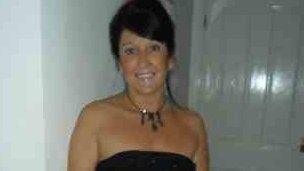Domestic abuse: How therapy helped my violent son to recover
- Published

Christine says the NSPCC helped her to rebuild my life
Children from violent homes are more likely to carry a weapon, seriously hurt others, drink alcohol, bully fellow students and damage the property of their peers, says a study by the NSPCC.
Inaction from the government and local authorities could cost society dearly, the charity warns.
Christine from Leeds is a victim of domestic abuse, but as she describes, she did not realise her son was being mentally scarred by the violence:
Things went very fast at the beginning of my relationship with Gareth.
Before I knew it he had moved in with me and after a while we were trying for a baby.
He only showed his violent side after I became pregnant.
When I was 10 weeks pregnant he threw me to the floor before smashing up my house.
I had him arrested but he was so sorry afterwards and said that he would pay for repairs. I believed him and dropped the charges.
The abuse continued when I was pregnant and after I had the baby, with him pushing me to the floor, pulling my hair and punching my face.
He regularly beat me up in front of the baby and my eldest son from a previous relationship.
Attacking children
My eldest was only six when the abuse started and he had to witness his stepfather attacking me for a year before I had enough and got him arrested and eventually convicted.
The NSPCC helped me to rebuild my life and my relationship with my sons.
But it was not until my eldest son was 10 that I started to see how much he was affected by witnessing his step-father attack me.
I noticed that he was angry a lot and he started to get into trouble at school. He got excluded for three days at a time on three separate occasions when he was 11 for attacking other children.
It makes me sick to the stomach even now, because it was something he saw his stepfather do to me.
Gareth had asked for contact with him and his younger brother, but my son said that if he was made to see his stepfather he was going to stab him.
He ran away from school once and then ran away from home in February 2011. He was only gone for three hours, but it was dark and rainy and felt like an eternity.
It was only after the police brought him back that he broke down and let me know how he was feeling.
Moving on
He could not make sense of what he was seeing when he was six, but by the age of 10 he became more aware of what he had seen and became angry as a result.
He threatened to harm himself and said he didn't want to live any more. It was heartbreaking.
He also told me that Gareth was physically abusive towards him, which I had not known.
He was referred for therapeutic help and I do not know what would have happened if he had not got this.
I had told him time and again that it was not his fault that Gareth attacked me, but his therapist helped him understand this and come to terms with what happened.
The therapist made my son believe that he was not a bad kid and helped him move on.
He is 12 now and still has times when he gets angry, but he knows how to control that anger now and has stopped lashing out at school.
I think therapeutic help is essential to help a child who has witnessed domestic violence move on from what has happened without lashing out at others.
- Published31 May 2012
- Published26 April 2012
- Published23 March 2012